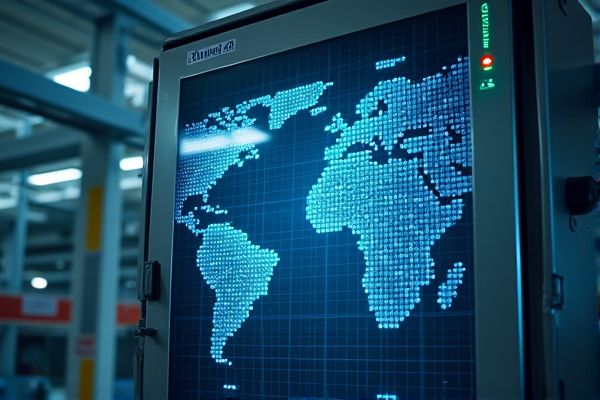
AI enhances glass manufacturing by optimizing production processes through real-time monitoring and predictive maintenance. Machine learning algorithms analyze vast amounts of data to identify defects and improve quality control, reducing waste and increasing efficiency. Automated systems, including robots, streamline tasks such as material handling and glass shaping, resulting in faster production times. Moreover, AI-driven analytics enable manufacturers to forecast demand and adjust supply chains accordingly, ensuring they meet market needs effectively.
AI usage in glass manufacturing
Predictive Maintenance
AI usage in glass manufacturing can enhance predictive maintenance by analyzing machinery data to foresee potential failures. This technology may reduce downtime and maintenance costs, positioning companies like Ardagh Group to improve operational efficiency. By leveraging machine learning algorithms, manufacturers can optimize production processes and resource allocation. The possibility of enhanced productivity through timely interventions offers a strategic advantage in a competitive market.
Quality Control Automation
AI can enhance quality control automation in glass manufacturing by analyzing production data in real-time. For instance, systems can detect defects in glass products more efficiently than traditional methods. This not only reduces waste but also improves overall product consistency. Implementing AI in this sector may lead to significant cost savings and increased production capacity.
Process Optimization
AI can enhance process optimization in glass manufacturing by analyzing production data to identify inefficiencies. For example, using machine learning algorithms, companies like Owens-Illinois can predict equipment failures before they occur, minimizing downtime. This predictive maintenance can lead to more efficient production schedules and reduced waste. Such advancements may result in lower operational costs and improved product quality.
Energy Management
AI can improve glass manufacturing by enhancing energy management through predictive analytics. Machine learning algorithms can analyze production data to optimize energy consumption, reducing costs. For example, a glass manufacturer may implement AI-driven systems to monitor and adjust kiln temperatures in real-time. This could lead to significant savings and increased efficiency within the production process.
Supply Chain Forecasting
AI can enhance efficiency in glass manufacturing by optimizing production processes and reducing waste. Implementing supply chain forecasting models can lead to better inventory management and timely deliveries. Companies like Corning Incorporated are leveraging AI to predict demand patterns and streamline operations. The integration of these technologies presents a significant opportunity for cost savings and improved responsiveness in the industry.
Defect Detection
AI technology can enhance defect detection in glass manufacturing by analyzing real-time data from production lines. For example, machine learning algorithms can identify anomalies in glass quality that might be missed by human inspectors. This capability could lead to reduced waste, increased efficiency, and improved product quality. Implementing AI solutions in institutions focusing on advanced manufacturing can provide a competitive edge in the industry.
Customized Production
AI can enhance efficiency in glass manufacturing by optimizing production processes and minimizing waste. Customized production becomes more feasible as AI analyzes consumer preferences and trends, allowing for tailored designs. For instance, a company like Owens Corning could use AI to streamline their operations, potentially reducing costs. This approach may lead to improved product quality and faster time-to-market for specialized glass products.
Waste Reduction
AI can optimize processes in glass manufacturing to significantly reduce waste. By predicting defects in real-time, manufacturers can minimize material loss during production. For example, institutions like the Fraunhofer Institute have explored AI applications for efficient quality control in glass production. Implementing these AI technologies could lead to improved sustainability and cost savings in operations.
Real-time Monitoring
AI integration in glass manufacturing can enhance real-time monitoring of production processes. It allows for the detection of anomalies that could lead to defects, thus improving product quality. For instance, companies like Owens Corning utilize AI-driven analytics to optimize their manufacturing efficiency. This technology presents a significant chance to reduce waste and operational costs in the industry.
Precision Glass Cutting
AI technology can enhance precision glass cutting by optimizing cutting patterns and reducing waste. Companies like Corning Incorporated have implemented AI algorithms to analyze data from past cutting processes, leading to improved efficiency. The possibility of minimizing defects during production is increased with AI's predictive capabilities. This technology may provide manufacturers a competitive edge in quality and cost-effectiveness.
 techknowy.com
techknowy.com